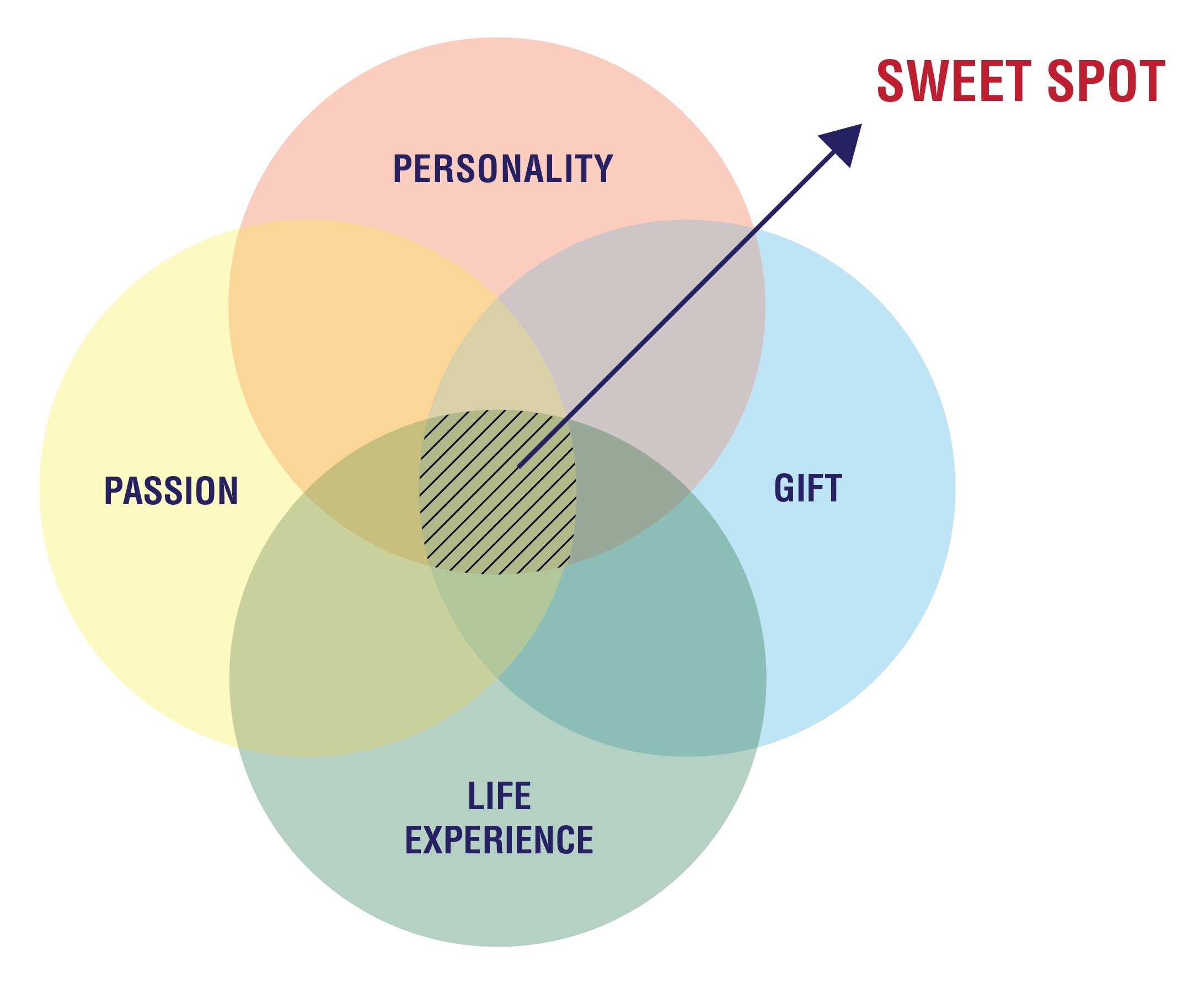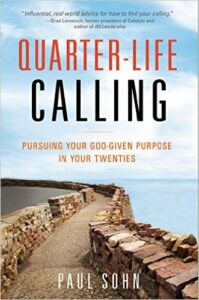Find Your Sweet Spot
When is the best time to start discovering your life’s purpose?
Most people are on an elusive chase to answer this big life question. We almost see it: then it disappears before we can grab hold of it.
My friend Paul Sohn says the best time to find your calling is in your twenties. Paul is a blogger, speaker and author who has a mission to help people find their passion. Paul has just released a book, Quarter-Life Calling: Pursuing Your God-Given Purpose in Your Twenties. It’s a guide for Millennials who are seeking their life’s sweet spot.
What’s the Paul Sohn definition of a sweet spot? Why does finding it matter?
I believe that sweet spot is that zone when you are living out your calling intentionally in every sphere of influence. Whether it is family, school, work, or church, living at your sweet spot is striving to find that place which is the intersection of your personality, gifts, passions, and life story. Your sweet spot leads you to live a life that matters – where you get to live out your purpose.
If you imagine a Venn diagram, finding your sweet spot is at the intersection of four interlocking circles. The first circle is about your personality – the specific tendencies and temperament you’re hardwired. The second circle is your giftedness, your marketable skills talents and strengths that some were born with and others developed over time. The third circle is your passions – the things that ignite your soul. And when you combine that with addressing the needs of the world that becomes a powerful force in discovering your calling. Lastly and not least, it’s your life story. You have gone through specific experiences, the ups and downs, the open doors and closed doors in life.

What are the symptoms of someone who has not found his/her sweet spot?
 You will be restless. St. Augustine said, “You have made us for yourself, O Lord, and our heart is restless until it rests in you.” We were created to praise God, to glorify God, to worship Him in every aspect of our lives. Without knowing our very purpose and calling from God creates this deep chasm. We begin to ask “why” and never get to the source of it. We become an occupational vagabond—a mindless zombie at work. We work but do not know why we are doing it. You often feel like an orphan always looking for your parents but not knowing who they are.
You will be restless. St. Augustine said, “You have made us for yourself, O Lord, and our heart is restless until it rests in you.” We were created to praise God, to glorify God, to worship Him in every aspect of our lives. Without knowing our very purpose and calling from God creates this deep chasm. We begin to ask “why” and never get to the source of it. We become an occupational vagabond—a mindless zombie at work. We work but do not know why we are doing it. You often feel like an orphan always looking for your parents but not knowing who they are.
You will trade joy for happiness. Happiness sounds good but it’s temporary; it comes and goes. Joy is something that is rooted in a deep sense of meaning and purpose that transcends an initial excitement. When you live in your sweet spot, you experience true joy.
Diagnosing the Quarter-Life Crisis
I’ve heard of a midlife crisis, but you say there is a quarter-life crisis. Really? What is it?
Quarter-life crisis is a period in which a person begins to feel doubtful about their own lives, brought on by anxiety, uncertainty, and inner turmoil that often accompanies the transition to adulthood. The term was coined by analogy with midlife crisis. I believe quarter-life crisis was precipitated due to the following reasons.
The Millennial generation faces a larger variety of choices and options more than any other generation. Often they become paralyzed by all of the possibilities. This explosion of options is something that has only occurred in the last fifty years. Our grandparents and great grandparents lived a lot simpler life where they either inherited their parents’ farm or followed their father’s trade. Today, Millennials will likely have ten to twelve jobs over their lifetime, including three or four different careers.
Twenty-somethings also live with an epidemic creating a comparison mindset. We want to become the next Instagram star, Mark Zuckerberg or Taylor Swift. This creates what’s called FOMO (Fear of Missing out). Just look at your latest Facebook or Instagram following. It might look like 80 percent of your high school friends are getting engaged, having children, or buying new cars and houses while you’re still trying to just get by as an adult.
Do you think this is a new phenomenon of the Millennial generation?
Yes, I think so. It’s taking longer and longer to become an adult today based on traditional markers such as financial independence and starting a family. It’s called “adultolescence.” Today, most twenty-somethings, 80 million generation strong, live with a staggering amount of fear, uncertainty, and hopelessness. Several decades ago, a majority of men and women completed all the major transitions into adulthood by age thirty, such as leaving home, finishing school, becoming financially independent, getting married and having a child. Today, less than 50 percent of men and women complete these transitions by age thirty. This is truly a VUCA world (volatile, uncertain, complex, ambiguous) where Millennials are learning how to navigate their lives around it.
The Difference Between a Job, A Calling, and A Career
You differentiate between a calling, a job, and a career. What’s the main difference?
People who have a job embrace the motto, “Everybody’s working for the weekend.” They live for breaks, for vacation. The job is simply a means to the end: a paycheck. They need it to support their family. A job is something short-term that we do for money. We often hear the phrase “dead end job” when people talk about their work.
The careerist derives meaning not from the nature of work itself but from the gratification that comes from advancing through the ranks and earning promotions.
Vocation or calling could be work that is outside your wage-earning sphere of activity. For example, a businessperson might have a vocation as a Sunday school teacher. A teacher might have a vocation as a worship leader. But vocation may also align with career or grow out of a specific career path. The vocation of a doctor or nurse might be “healer.” The vocation of a teacher might be “nourisher.” Vocation is more stable and permanent over a lifetime.
Inspire Millennials With Vision
 What’s your advice to someone managing a group of people in their twenties? How do you motivate them? Is it different to motivate them than those in other generations?
What’s your advice to someone managing a group of people in their twenties? How do you motivate them? Is it different to motivate them than those in other generations?
Understand that empowerment is key. Instead of telling them the “how,” inspire them with the vision. Millennials are a cause-oriented generation that wants their job to mean more than a paycheck. Millennials are life-long learners. They are looking for leaders who lead by example. Mentorship is key. Partner them with outstanding employees they can model themselves after. I’ve also seen that reverse mentoring works very well. Done well, reverse mentoring can play an important role in bridging the generational gap in the workplace.
Are the principles of finding your calling and your sweet spot the same whether you are 20 or 50?
I believe the principles of finding your calling and your sweet spot are the same, but the context in which a 20-something or a 50-something processes looks quite different. It’s really a process of paying attention. Paying attention to the four areas of your sweet spot which will help you live with greater intentionality.
For more information:
Quarter-Life Calling: Pursuing Your God-Given Purpose in Your Twenties
